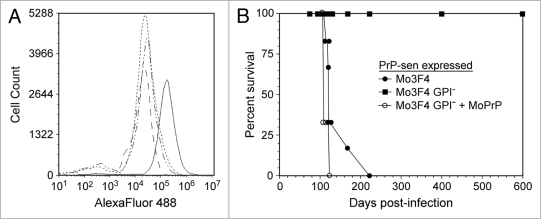Figure 1.
Persistent infection of cells in vitro requires the expression of GPI-anchored cell surface PrP-sen. PrP knockout cells (CF10)21 were transduced with 3F4 epitope tagged mouse PrP-sen (Mo3F4), 3F4 epitope tagged mouse PrP-sen without the GPI anchor (Mo3F4 GPI-), or Mo3F4 GPI-PrP-sen plus wild-type, GPI anchored mouse PrP-sen (MoPrP). The cells were then exposed to the mouse scrapie strain 22L and passaged. (A) The presence of 3F4 epitope tagged, cell surface mouse PrP-sen was assayed by FACS analysis of fixed, non-permeabilized cells. CF10 cells expressing the following mouse PrP-sen molecules were assayed: Mo3F4 (solid line); Mo3F4 GPI− (dashed line); Mo3F4 GPI− + MoPrP (dotted and dashed line); Mo3F4 GPI− + MoPrP infected with 22L scrapie (dotted line). Only cells expressing Mo3F4 PrP-sen were positive for cell surface, 3F4 epitope tagged PrP. (B) Persistent infection was analyzed by inoculating the cells intracranially into transgenic mice overexpressing MoPrP (Tga20 mice). Only cells expressing anchored mouse PrP-sen were susceptible to scrapie infection. Cells expressing anchorless mouse PrP-sen did not contain detectable infectivity in either the cells or the cellular supernatant (data not shown). Data in (B) are adapted from McNally 2009.17

